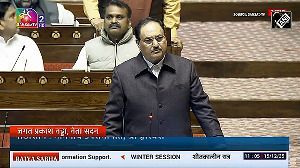Like everything else in China, its largely State-controlled media too is changing, and changing rapidly, feels Nitin Gokhale.
Edit writers called on the government to dismantle the five-decade-old restrictions on rural to urban migration. A household-registration system denies rural citizens access to healthcare when they migrate to cities. Urban per capita income last year was 17,175 Yuan ($2,525), more than three times the 5,153 Yuan ($758) rural Chinese take home.
Five, or even four years ago, such hard-hitting reports and editorials would have been unthinkable.
Not just the content, even the design is undergoing rapid change.
Staid, communist era news rags like the China Daily have got a makeover in recent months that suggests it is facing tough competition from new entrants like the Global Times, controlled by the Chinese Communist Party and yet a daily filled with diverse and often, critical views on the country's policies.
China Central Television now runs many more international programmes than ever before. It plans to station foreign correspondents across the globe in the next few years in stark contrast to about two dozen bureaus in world capitals at present.
And the New China News Agency, more popularly known as Xinhua, wants to move into television very soon.
At the heart of this frenetic outward expansion is perhaps a painful realisation within the Chinese government that for all its new-found 'nearly-there' superpower, the world does not take China's soft power too seriously.
Even the Economist took notice. Early this month in a full column focused on the Chinese media, it said, 'Change is coming thick and fast
the press does sometimes expose and criticise official wrongdoing -- one this week, for example, editorialised against the police's use of torture.'
The transformation has not happened overnight though. Even two years ago, in the immediate aftermath of the Sichuan earthquake in May 2008, the first stirrings of change were evident.
Yours truly happened to be in China within a week of that earthquake. To me the most remarkable feature of the post-earthquake effort in China was the unprecedented openness displayed by the Chinese government in allowing access to media teams in the earthquake-hit areas.
Most Chinese journalists that one interacted with during that trip attributed the change to the growing tribe of online bloggers and part-time reporters. Their preliminary information from the heart of quake-hit areas forced the authorities to abandon their long-held belief that simply blocking physical access would prevent any bad news from coming out.
Within an hour of the quake, thousands of Chinese web users turned into citizen journalists, talking about the culpability of the vain and self-centred officials who were held responsible for the death of thousands of children who were killed because of poor-quality construction of school buildings that collapsed like a pack of cards in the quake.
To its credit, the Chinese government promptly saw the writing on the wall.
And so, in a complete break from past policy, Xinhua almost immediately publicised the epicenter of the quake in its web site in less than an hour after the quake occurred and began to update the disaster information ever since.
CCTV was not far behind. The two state-owned media entities and other foreign media were granted permission for live coverage from the quake area.
And for the first time, Chinese people saw their leaders, notably President Hu Jintao and Premier Wen Jiabao, wading into a crowd of affected people, shaking hands, consoling the victims and directing government quake relief efforts. It was government PR at its best.
Since that transformational period, the Chinese media has travelled some distance. The new-found spunk among at least some of the media practitioners is posing a new set of challenges to the moribund Communist Party apparatus. Their basic dilemma: how much freedom should they grant to newspapers, web sites and television stations in reporting on a country and society undergoing a social churn in the wake of three decades of sustained economic growth?
Several factors will determine what direction the Chinese media takes in the next few years. Will it truly transform itself and break free of state control?
Unlikely.
And yet growing internet penetration and the government's desire to be treated with respect in the international arena may contribute in further opening up of the Chinese media.
In the past President Hu has spoken about the 'West's strength and our weakness' in the global exchange of ideas. How he and his colleagues hope to redress the balance is something that the world will watch with interest.
But for all its progress towards transparency in dealing with the media, make no mistake: when it comes to reporting on higher echelons of the ruling Communist Party of China, the Chinese media will continue to remain muted.
Those who wish to see an open, critical, vibrant and privately owned media to function and flourish in China, the wait will be longer than usually perceived. That is the reality despite all the big strides made by the Chinese media in recent times.




